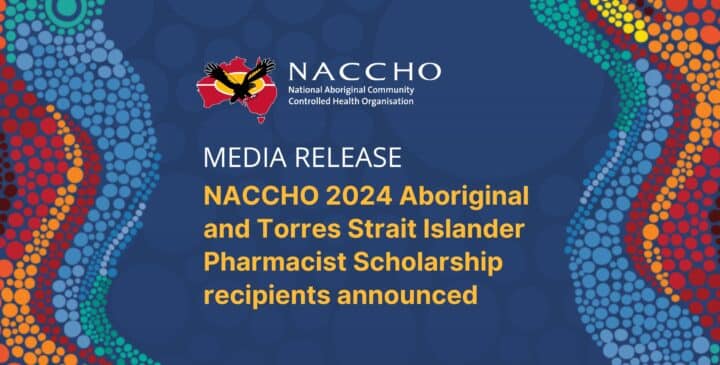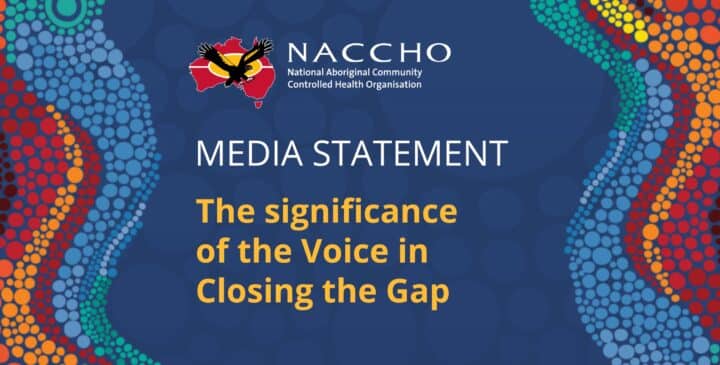

Enlisting pharmacists to help close the gap – Joint Media release

New medical research shows the potentially life-saving benefits of integrating pharmacists within Aboriginal Community Controlled Health Services to improve chronic disease management.
James Cook University (JCU), the Pharmaceutical Society of Australia (PSA) and the National Aboriginal Community Controlled Health Organisation (NACCHO) have joined forces to explore this potential by way of a project which will to embed pharmacists in 22 Aboriginal community-controlled health services in Queensland, Victoria and the Northern Territory.
Funded by the Australian Government under the 6th Community Pharmacy Agreement, the pioneering project will see culturally trained pharmacists working with clinical staff and patients to improve medication use. The first project pharmacists commenced in July this year.
Research by JCU Associate Professor, General Practice and Rural Medicine, Sophia Couzos, reveals the project is vital because the inability of many Aboriginal and Torres Strait Islander people with chronic diseases to access pharmacist support may be placing lives at risk.
Dr Couzos said these patients often struggle with medication regimes – including treatment for life-threatening conditions like diabetes and cardio-vascular disease.
“There is a higher burden of chronic disease in the Aboriginal community, and these patients are likely to be prescribed multiple medicines, which also place them at greater risk of drug-related complications,” she said.
“Yet they have limited access to appropriate pharmacist advice across Australia, particularly in remote areas. We know that ‘drugs don’t work if patients don’t taken them’, so finding ways to optimise this is a vital health system improvement.”
The project pharmacists, located within the primary healthcare teams of Aboriginal health services, will assist individual patients to overcome obstacles, and prescribers to optimise medication choices.
“These pharmacists will be providing advice in a culturally safe environment for the patient, where they can feel at ease,” Dr Couzos pointed out.
NACCHO Director, Medicines Policy and Programs, Mike Stephens, said the pharmacists would also educate staff and liaise with external stakeholders, including hospitals, to develop strategic plans for more effective medicine use.
“There’s good evidence that pharmacists in health services improve patient health,” he said.
The United Kingdom is investing heavily in programs that place pharmacists in primary healthcare teams, according to Mr Stephens. But the practice only occurs on an ad hoc basis in Australia. Despite this, there is no shortage of pharmacists keen to play frontline roles within Aboriginal health services, he maintained.
Ms Hannah Mann, a community pharmacist speaking on behalf of the Pharmacy Guild of Australia said “There are many community pharmacists who already have experience working with Aboriginal community controlled health services, who have excellent relationships with them, and who are looking to further strengthen these ties between community pharmacy and health services to better the health outcomes of patients.”
PSA Manager, Health Sector Engagement, Shelley Crowther, said the peak national body for pharmacists had been advocating for a number of years that pharmacists play an active role in improving medication management for Aboriginal and Torres Strait Islander people.
“There is a lot of evidence to support that medication misadventure results in cost to the health system,” she said. “The Australian Commission on Safety and Quality in Healthcare estimates medication-related admissions to hospitals Australia-wide cost $1.2 billion annually.
“The discrepancies in health outcomes for Aboriginal and Torres Strait Islander people give even greater weight to the importance of embedding pharmacists to reduce medication misadventure and improve medication management to try to achieve better health outcomes.”
The project is scheduled to run until early 2020 and JCU will measure the healthcare improvements in chronic disease sufferers supported by project pharmacists.
“If the quality of care improves, that will lead to health dollar savings down the track because we know that access to quality primary health care can prevent unnecessary hospitalisations,” Dr Couzos said. “This project will give impetus to the Australian Government to explore how healthcare workforce innovation may enhance access to quality healthcare for Aboriginal and Torres Strait Islander people.” Associate Professor Couzos is presenting a paper about the project at the Community Pharmacy Stakeholder Forum in Sydney on the 7th September 2018.
Contacts:
Associate Professor Sophia Couzos
07 4781 6062
0417 178 514
Sophia.couzos@jcu.edu.au
Julian Fitzgerald – NACCHO Media liaison
02 6246 9347
0413 982 224
Julian.Fitzgerald@naccho.org.au
Jarryd Luke – PSA Senior Communications Officer
0487 922 176

